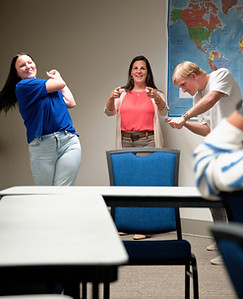Helping pivot
your mental game
Pivot (verb): to adapt or improve by adjusting or modifying something
I grew up training in Isshin-ryu karate, and when I began my graduate work in sport psychology, I began understanding the science behind so much of the mental game our karate masters passed down. One of the major philosophies of the style is
“The body should be able to change direction at any time.”
As with many karate lessons, this philosophy isn’t just about the body; we must also be able to change directions mentally.
We sometimes need to pivot our mental strategies.
I collaborate with athletes, coaches, teams, and business professionals at various levels. We use the science of sport psychology, the art of mental coaching, and the individual's self-knowledge to more effectively use and train mental skills so individuals can better monitor and adjust their own mindsets and achieve more consistent peak performances.
Explore our services below to see how we can help you.

Dr. Stephanie Cameron
Certified Mental Performance Consultant
Registered Mentor for CMPC Candidates

Services
Most athletes and coaches attribute a large percentage of their game to mindset, yet do not regularly train their minds. Often, that is because they aren’t sure exactly how. A strategy that works for one person may not work for others. Training mental skills instead of working on physical skills may seem like too much downtime. That is where sport psychology comes into the training space. We teach actionable strategies to train and sustain mental skills.
Sport psychology focuses on mental skills training to enhance athletic performance. Cognitive skills such as concentration, confidence, resilience, emotional agility, self-talk, visualization, and managing performance anxiety are trainable, just like physical skills. The goal is to help athletes consistently perform at their best by optimizing their mental game, increasing their self-awareness, and refining ineffective mental strategies or perspectives.
Sport psychology professionals can work with teams and individuals in various ways. Long-term interventions are optimal for maximal development. For teams, this may involve an embedded sport psychology professional for the season. They may lead regular weekly team sessions throughout the season, assist in intensive pre-season team development and player self-analysis, and interact regularly with players through observations of practices and individualized private sessions. Having an embedded SPP working regularly with your team enables comprehensive mental skills programming, early intervention for any issues, and the integration of mental training into your program's culture.
For those who cannot or are not ready to commit to long-term work, mid-term interventions can provide similar mental skills training opportunities at a lower cost for the team. This may involve intensive season-specific workshops, ongoing team sessions held a few times per month, consistent individual private sessions, or small group sessions tailored to specific positions (e.g., goalies, pitchers) or roles (e.g., captains, seniors, coaches) within the team.
The more integrated the sport psychology professional is into the team and players, short-term interventions can be utilized. This would include game-day presence, practice observations, in-the-moment adjustments, and pre-competition and single-session consultations. This level provides immediate support during critical moments, allows the sport psychology professional to help athletes make real-time mental adjustments, manage unexpected pressure, and maintain composure during competition.




